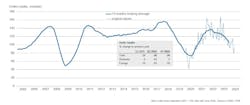Machine Tool Orders Remain Weak
The German Machine Tool Builders Assn. (VDW) reported a -28% decrease in new orders during Q2 2024, versus 2023. Orders from domestic manufacturers and machine shops were down by -13% year-over-year, while orders for exports were down by -33%.
Through six months of activity for 2024, VDW noted that orders had fallen by -26% versus the January-June 2023, with a -7% drop in domestic orders and a -33% decrease in orders from abroad.
VDW represents the world’s third-largest machine-tool manufacturing sector, with 64% of its products exported to markets in Europe and worldwide.
For comparison, over the same six-month period, AMT - the Assn. for Manufacturing Technologies reported that new orders in the U.S. market over the same six-month period trailed January-June 2023 new orders by -10.7%.
"The order volume is at its lowest level since Q4 2020," explained Dr. Markus Heering, VDW executive. "Orders from abroad fell significantly, whereas those from Germany held up better. However, this is not due to the hoped-for turnaround, but rather the result of a handful of project-based business deals," he continued.
VDW explained that orders have fallen across all market segments, with some better indicators in aviation, medical technology, power engineering, and shipbuilding. “Interest in electric vehicles is currently sluggish as evidenced by the weak sales figures,” the group reported.
For German machine tool builders, demand for service, components, repairs, maintenance, and conversions have been stronger than for new machines, and automation is still a driving factor in their business activities.
Looking ahead, VDW said new-orders are not expected to stabilize to any great extent until the second half of 2024, and more specifically during Q4. "The forecast growth will not, however, be able to compensate for the losses from the last two years," Markus Heering stated.

